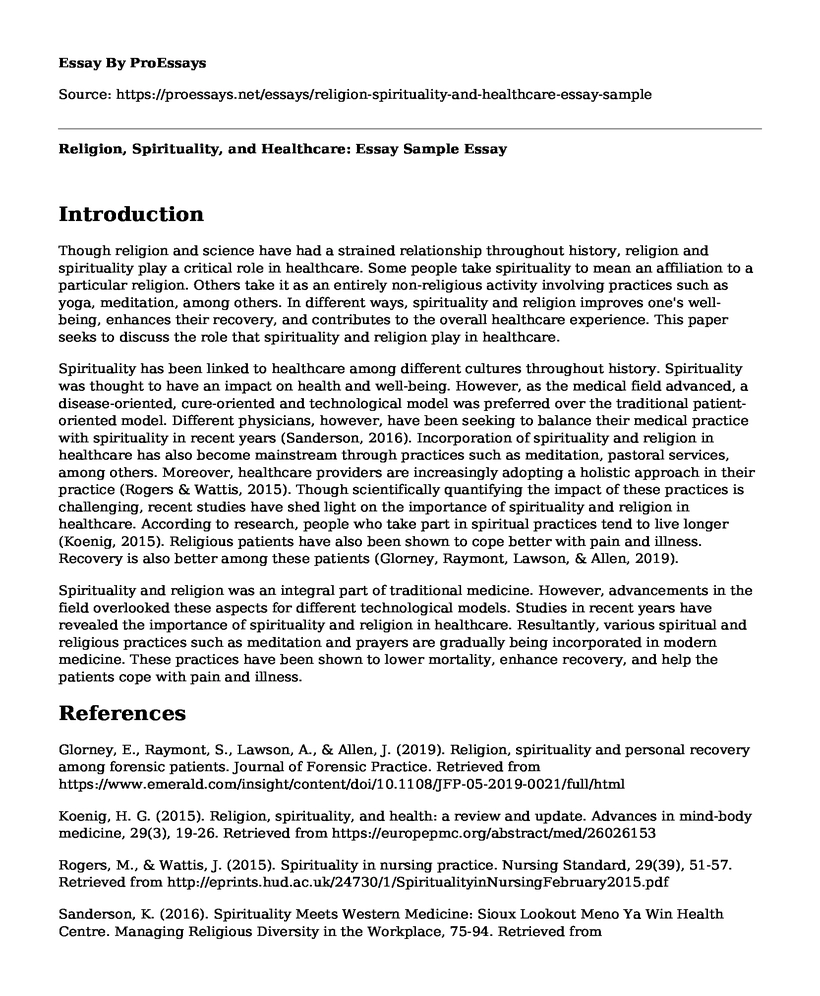Introduction
Though religion and science have had a strained relationship throughout history, religion and spirituality play a critical role in healthcare. Some people take spirituality to mean an affiliation to a particular religion. Others take it as an entirely non-religious activity involving practices such as yoga, meditation, among others. In different ways, spirituality and religion improves one's well-being, enhances their recovery, and contributes to the overall healthcare experience. This paper seeks to discuss the role that spirituality and religion play in healthcare.
Spirituality has been linked to healthcare among different cultures throughout history. Spirituality was thought to have an impact on health and well-being. However, as the medical field advanced, a disease-oriented, cure-oriented and technological model was preferred over the traditional patient-oriented model. Different physicians, however, have been seeking to balance their medical practice with spirituality in recent years (Sanderson, 2016). Incorporation of spirituality and religion in healthcare has also become mainstream through practices such as meditation, pastoral services, among others. Moreover, healthcare providers are increasingly adopting a holistic approach in their practice (Rogers & Wattis, 2015). Though scientifically quantifying the impact of these practices is challenging, recent studies have shed light on the importance of spirituality and religion in healthcare. According to research, people who take part in spiritual practices tend to live longer (Koenig, 2015). Religious patients have also been shown to cope better with pain and illness. Recovery is also better among these patients (Glorney, Raymont, Lawson, & Allen, 2019).
Spirituality and religion was an integral part of traditional medicine. However, advancements in the field overlooked these aspects for different technological models. Studies in recent years have revealed the importance of spirituality and religion in healthcare. Resultantly, various spiritual and religious practices such as meditation and prayers are gradually being incorporated in modern medicine. These practices have been shown to lower mortality, enhance recovery, and help the patients cope with pain and illness.
References
Glorney, E., Raymont, S., Lawson, A., & Allen, J. (2019). Religion, spirituality and personal recovery among forensic patients. Journal of Forensic Practice. Retrieved from https://www.emerald.com/insight/content/doi/10.1108/JFP-05-2019-0021/full/html
Koenig, H. G. (2015). Religion, spirituality, and health: a review and update. Advances in mind-body medicine, 29(3), 19-26. Retrieved from https://europepmc.org/abstract/med/26026153
Rogers, M., & Wattis, J. (2015). Spirituality in nursing practice. Nursing Standard, 29(39), 51-57. Retrieved from http://eprints.hud.ac.uk/24730/1/SpiritualityinNursingFebruary2015.pdf
Sanderson, K. (2016). Spirituality Meets Western Medicine: Sioux Lookout Meno Ya Win Health Centre. Managing Religious Diversity in the Workplace, 75-94. Retrieved from https://www.taylorfrancis.com/books/e/9781315593623/chapters/10.4324/9781315593623-10
Cite this page
Religion, Spirituality, and Healthcare: Essay Sample. (2023, Feb 12). Retrieved from https://proessays.net/essays/religion-spirituality-and-healthcare-essay-sample
If you are the original author of this essay and no longer wish to have it published on the ProEssays website, please click below to request its removal:
- Health of Older Adults
- Bread Price Fixing
- Essay on Light Another Candle: The Life of a Nurse and the Ideal of Caring
- EHRs vs Survey Data in Health Care: Quality Measurements - Essay Sample
- Essay Sample on Mary Eliza Mahoney: Nursing Pioneer, First Black Nurse in Profession
- Paper Sample on US Healthcare Finances: Hospital Chief & Secretary Discuss Third-Party Payments
- Nurses' Perspectives on Bed Enclosure - Free Article Review







